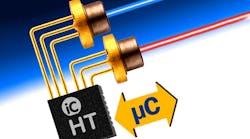iC-Haus’ new iC-HT driver permits microcontroller-based activation of laser diodes in CW mode. Laser diodes can be driven by either the optical output power (using APC), the laser diode current (using ACC) or a full, controller-based power control unit. The maximum laser diode current per channel is 750 mA, and both channels can be switched in parallel for particularly high laser diode currents of up to 1.5 A. Internal operating points and voltages can be output through ADCs. An integrated temperature sensor permits the system temperature to be monitored and can also be used to check for feedback in the control circuit. Logarithmic DACs allow optimum power regulation across a large dynamic range enabling a variety of laser diodes to be used. The driver works on supply voltages of 2.8 V to 8 V with operating temperatures ranging from -40°C to +125°C. Housed in a 28-pin QFN package measuring 5 x 5 mm, the iC-HT laser diode driver is available at standard lead times for $13.20 each/1,000.

Sponsored Recommendations
Sponsored Recommendations
TTI Transportation Resource Center
April 8, 2024
TTI Hybrid & Electric Vehicles Line Card
April 8, 2024
Comments
Comments